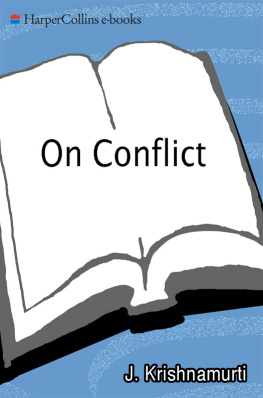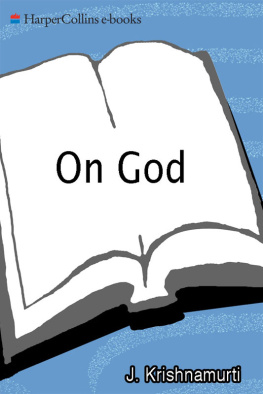Krishnamurti - On Conflict
Here you can read online Krishnamurti - On Conflict full text of the book (entire story) in english for free. Download pdf and epub, get meaning, cover and reviews about this ebook. City: San Francisco;CA, year: 1994, publisher: HarperCollins;HarperSanFrancisco, genre: Religion. Description of the work, (preface) as well as reviews are available. Best literature library LitArk.com created for fans of good reading and offers a wide selection of genres:
Romance novel
Science fiction
Adventure
Detective
Science
History
Home and family
Prose
Art
Politics
Computer
Non-fiction
Religion
Business
Children
Humor
Choose a favorite category and find really read worthwhile books. Enjoy immersion in the world of imagination, feel the emotions of the characters or learn something new for yourself, make an fascinating discovery.
- Book:On Conflict
- Author:
- Publisher:HarperCollins;HarperSanFrancisco
- Genre:
- Year:1994
- City:San Francisco;CA
- Rating:5 / 5
- Favourites:Add to favourites
- Your mark:
- 100
- 1
- 2
- 3
- 4
- 5
On Conflict: summary, description and annotation
We offer to read an annotation, description, summary or preface (depends on what the author of the book "On Conflict" wrote himself). If you haven't found the necessary information about the book — write in the comments, we will try to find it.
On Conflict considers two of the most vital issues of our time--violence and conflict. Krishnamurti shows that the origins of these divisive experiences lie in confusion and turmoil and teaches that inward activity dictates outer activity.
On Conflict — read online for free the complete book (whole text) full work
Below is the text of the book, divided by pages. System saving the place of the last page read, allows you to conveniently read the book "On Conflict" online for free, without having to search again every time where you left off. Put a bookmark, and you can go to the page where you finished reading at any time.
Font size:
Interval:
Bookmark:

The moment you directly question the cause of war, you are questioning your relationship with another, which means that you are questioning your whole existence, your whole way of living.
Bombay, 7 March 1948
You have voluntarily to examine your life, not condemn it, not say this is right or this is wrong but look. When you do look in that way, you will find that you look with eyes that are full of affectionnot with condemnation, not with judgment, but with care. You look at yourself with care and therefore with immense affectionand it is only when there is great affection and love that you see the total existence of life.
Madras, 22 December 1965
J IDDU KRISHNAMURTI was born in India in 1895 and, at the age of thirteen, was taken up by the Theosophical Society, which considered him to be the vehicle for the world teacher whose advent it had been proclaiming. Krishnamurti was soon to emerge as a powerful, uncompromising, and unclassifiable teacher, whose talks and writings were not linked to any specific religion and were of neither the East nor the West but for the whole world. Firmly repudiating the messianic image, in 1929 he dramatically dissolved the large and monied organization that had been built around him and declared truth to be a pathless land, which could not be approached by any formalized religion, philosophy, or sect.
For the rest of his life Krishnamurti insistently rejected the guru status that others tried to foist upon him. He continued to attract large audiences throughout the world but claimed no authority, wanted no disciples, and spoke always as one individual to another. At the core of his teaching was the realization that fundamental changes in society can be brought about only by a transformation of individual consciousness. The need for self-knowledge and understanding of the restrictive, separative influences of religious and nationalistic conditionings was constantly stressed. Krishnamurti pointed always to the urgent need for openness, for that vast space in the brain in which there is unimaginable energy. This seems to have been the wellspring of his own creativity and the key to his catalytic impact on such a wide variety of people.
Krishnamurti continued to speak all over the world until he died in 1986 at the age of ninety. His talks and dialogues, journals and letters have been preserved in over sixty books and hundreds of recordings. From that vast body of teachings this series of theme books has been compiled. Each book focuses on an issue that has particular relevance to and urgency in our daily lives.
Questioner: I am sure most of us have seen authentic pictures in movies and magazines of the horrors and barbarities of the concentration camps. What should be done, in your opinion, with those who have perpetrated these monstrous atrocities? Should they not be punished?
Krishnamurti: Who is to punish them? Is not the judge often as guilty as the accused? Each one of us has built up this civilization, has contributed towards its misery, is responsible for its actions. We are the outcome of each others actions and reactions; this civilization is a collective result. No country or people is separate from another; we are all interrelated; we are one. Whether we acknowledge it or not, when a misfortune happens to a people, we share in it as in its good fortune. You may not separate yourself to condemn or to praise.
The power to oppress is evil, and every group that is large and well organized becomes a potential source of evil. By shouting about the cruelties of another country, you think you can overlook those of your own. It is not only the vanquished but every country that is responsible for the horrors of war. War is one of the greatest catastrophes; the greatest evil is to kill another. Once you admit such an evil into your heart, you let loose countless minor disasters. You do not condemn war itself but him who is cruel in war.
You are responsible for war; you have brought it about by your everyday action of greed, ill will, passion. Each one of us has built up this competitive, ruthless civilization, in which man is against man. You want to root out the causes of war, of barbarity in others, while you yourself indulge in them. This leads to hypocrisy and to further wars. You have to root out the causes of war, of violence, in yourself, which demands patience and gentleness, not bloody condemnation of others.
Humanity does not need more suffering to make it understand, but what is needed is that you should be aware of your own actions, that you should awaken to your own ignorance and sorrow and so bring about in yourself compassion and tolerance. You should not be concerned with punishment and reward but with the eradication in yourself of those causes that manifest themselves in violence and in hate, in antagonism and ill will. In murdering the murderer, you become like him; you become the criminal. A wrong is not righted through wrong means; only through right means can a right end be accomplished. If you would have peace, you must employ peaceful means, and mass murder, war, can only lead to further murder, further suffering. There can be no love through bloodshed; an army is not an instrument of peace. Only goodwill and compassion can bring peace to the world, not might and cunning nor mere legislation.
You are responsible for the misery and disaster that exist, you who in your daily life are cruel, oppressive, greedy, ambitious. Suffering will continue till you eradicate in yourself those causes that breed passion, greed, and ruthlessness. Have peace and compassion in your heart, and you will find the right answer to your question.
Questioner: You decry war, and yet are you not supporting it?
Krishnamurti: Are we not all of us maintaining this terrible mass murder? We are responsible, each one, for war; war is an end result of our daily life; it is brought into being through our daily thought-feeling-action. What we are in our occupational, social, religious relationships, that we project; what we are, the world is.
Unless we understand the primary and secondary issues involved in the responsibility for war, we shall be confused and unable to extricate ourselves from its disaster. We must know where to lay the emphasis, and then only shall we understand the problem. The inevitable end of this society is war; it is geared to war; its industrialisation leads to war; its values promote war. Whatever we do within its borders contributes to war. When we buy something, the tax goes towards war; postage stamps help to support war. We cannot escape from war, go where we will, especially now, as society is organized for total war. The most simple and harmless work contributes to war in one way or another. Whether we like it or not, by our very existence we are helping to maintain war. So what are we to do? We cannot withdraw to an island or to a primitive community, for the present culture is everywhere. So what can we do? Shall we refuse to support war by not paying taxes, by not buying stamps? Is that the primary issue? If it is not, and it is only secondary, then do not let us be distracted by it.
Is not the primary issue much deeper, that of the cause of war itself? If we can understand the cause of war, then the secondary issue can be approached from a different point of view altogether; if we do not understand, then we shall be lost in it. If we can free ourselves from the causes of war, then perhaps the secondary problem may not arise at all.
So emphasis must be laid upon the discovery within oneself of the cause of war; this discovery must be made by each one and not by an organized group, for group activities tend to make for thoughtlessness, mere propaganda, and slogans, which only breed further intolerance and strife. The cause must be self-discovered, and thus each one through direct experience liberates himself from it.
Next pageFont size:
Interval:
Bookmark:
Similar books «On Conflict»
Look at similar books to On Conflict. We have selected literature similar in name and meaning in the hope of providing readers with more options to find new, interesting, not yet read works.
Discussion, reviews of the book On Conflict and just readers' own opinions. Leave your comments, write what you think about the work, its meaning or the main characters. Specify what exactly you liked and what you didn't like, and why you think so.










